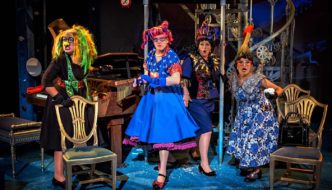Review: BIRDSONG by Sebastian Faulks
November 7, 2014
Earlier this year we marked the centenary of the start of the First World War. Centenaries are things we often celebrate but there was little, if anything, to celebrate about WW1. Other than its ending perhaps, which may explain why I decided to wait until now before choosing it as the subject of my book review for November. Sunday the 9th is Remembrance Sunday and with Book Talk due on the 10th it seemed appropriate.
Some while ago I recall saying how some films we watch are instantly forgettable and how some of them stay with us for a long time. I’ve proved my point by forgetting which film I was talking about – but that’s nothing unusual these days. Similarly, there are books you can read which fade quickly from the memory – I should know, I’ve reviewed a few of those this year. What I can tell you is that BIRDSONG is definitely not one of them. Whenever the First World War and the Western Front is mentioned in future, I will have difficulty in thinking of any other.
I have to say I approached it a bit offhandedly. Its reputation preceded it and I’m always wary under such circumstances. I must also confess I had become a little tired of talk of the trenches, almost war-weary if you like, and thought there must be other aspects of WW1 that we could learn about. I expressed this feeling in my recent review of PRIVATE PEACEFUL by Michael Morpurgo, which I unfairly accused of being rather lightweight until I realised it was intended for a younger age group. I hoped to redeem myself by adding a postscript relating to something I had genuinely gained from it. What I might gain from BIRDSONG was open to question.
Well, BIRDSONG is anything but lightweight. It’s most definitely for adults and you would have to be utterly devoid of feeling to say you were unaffected by it. I found it harrowing in places and rather than being unable to put it down, there were times I found it hard to pick up. All war is horrific, but Faulks deals with it in such a matter-of-fact way that its terrors, which at times appear commonplace and incidental to the narrative, impact on us all the more greatly.
There are extremes of both horror and passion here. The first part of the book is devoted to an erotic love affair, something you might never guess at from its placid opening pages, a fact which I found interesting as a writer. This is in an age when we are told how we must dramatise our beginnings in order to attract the reader. To be led through the sleepy streets of Amiens to the Azaire’s house is akin to being taken blindfold toward an extinct volcano. Don’t let this gentle introduction fool you – the volcano soon starts to smoulder and eventually erupts.
This might be enough to sustain the hero, Stephen Wraysford, through the early part of the war, but it cannot last for long. As I said to begin with, nowadays we might believe ourselves accustomed to what life was like in the trenches but Stephen’s war takes us to another place as he is literally forced underground where he can escape the bombardment of shells and memory. They say you should be careful what you wish for and when I asked for a different perspective I wasn’t prepared for the claustrophobic world of the mining engineer. This, if anything, was the part of the book I found most difficult to deal with. I think I must have a fear of confined spaces – the morbid sense of being buried alive while still actually breathing still haunts me. In the past I have been known to read a book and then watch the film for comparison. I had recorded the TV version of BIRDSONG ready for just such an occasion – now I don’t think I could bear to watch it.
On a more uplifting note, the book does at least attempt a positive ending. When they first appeared, I questioned the need for the sections set in the 1970s. I failed to see their significance and thought them out of place. I still think them a little contrived and awkward but without them and the redemption they bring, we would be left in the same bleak and desolate landscape as Faulks’ soldiers.
The heroism and unflinching humanity these ordinary people displayed is something those of us who’ve lived our lives untroubled by war will probably never understand. They had to be phenomenally brave to survive – in the mental sense as much as the physical. BIRDSONG brings that home to us in no uncertain terms. Take heed, because as a reader of this book you will need to be likewise.
N. E. David
www.nedavid.com
Follow Nick on Twitter @NEDavidAuthor




Comments